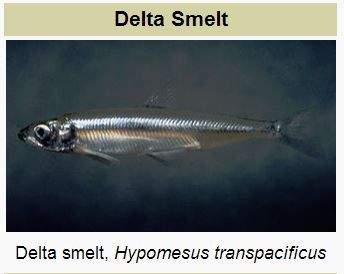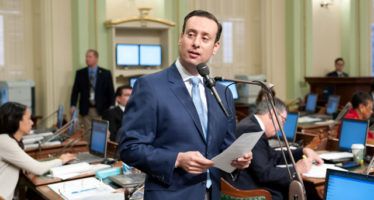Supreme Court refuses to hook Delta smelt case

 Yesterday the U.S. Supreme Court refused to put a hook into an appeal of lower-court actions that shut off water to farmers and cities in 2007 and 2013 in favor of Delta smelt.
Yesterday the U.S. Supreme Court refused to put a hook into an appeal of lower-court actions that shut off water to farmers and cities in 2007 and 2013 in favor of Delta smelt.
In the Los Angeles Times summary:
“The justices turned down appeals from several water agencies, including the Metropolitan Water District of Southern California, and from Central Valley farmers.
“In their appeal, the water agencies questioned whether limits on pumping water to the southern part of the state were required under the Endangered Species Act and said the restrictions were particularly harmful to consumers, farmers and other water users during the drought.”
The two cases were forwarded to the high court because the plaintiffs contended there was a conflict between prior rulings from the 4th and 9th U.S. Circuit Courts of Appeal regarding the implementation of the federal Endangered Species Act. At issue was whether the U.S. Department of the Interior and its sub-agency, the U.S. Fish and Wildlife Service, could consider the economic impact on farmers and cities when implementing provisions of the ESA to protect endangered species.
According to legal counsel for the Delta Stewardship Council, the suits did not intend to balance wildlife and restrictions on releases of water for farms and cities. (The Delta Stewardship Council is a semi-independent body under the California governor’s office established under the Delta Reform Act of 2009.)
However, environmentalists claimed any balancing of wildlife protection and economic harm to farmers and cities would be at the expense of wildlife extinction and that farming and community impacts were exaggerated.
The combined lawsuits sought answers to the following three questions:
- Was the FWS obligated to show how a “reasonable and prudent alternative” to protecting the smelt is economically feasible? Or could it ignore devastating impacts on communities, as the 9th U.S. Circuit Court of Appeals in San Francisco ruled in 2014?
- To what extent was the FWS’s interpretation of regulations entitled to “deference”? This means the court defers or subordinates its interpretation of law to other non-judicial parties, such as the biological opinion of government scientists. Paradoxically, the biological opinion of government scientists in a 2007 smelt court case in National Resources Defense Council vs. Norton was that the smelt were in “no jeopardy” of extinction (see Congressional Research Service, Hydrological and Regulatory Issues, page 15).
- Should the Supreme Court overturn its prior decision in Tennessee Valley Authority vs. Hill of 1978 (the famous “Snail Darter Case”), which required federal agencies to give protection of wildlife species “their highest priority” and at “whatever the cost,” even in extreme situations such as droughts?
The Butterfly Effect
A related case was the 5th U.S. Circuit Court case in 2014 of Arkansas Project vs. Shaw, which involved issuing water withdrawal permits in Texas that resulted in the deaths of 23 whooping cranes. An issue in that case was whether the “butterfly effect” was relevant.
The “butterfly effect” is the idea that a butterfly flapping its wings in China can affect storm systems in New York.
In that case, the 5th Circuit ruled the water withdrawal project failed to plan for droughts, causing the loss of a few whooping cranes – even though cranes still thrived despite the drought. In other words, the loss of a butterfly or 23 cranes was of no legal consequence because it was accidental and did not jeopardize the species.
The Texas Commission on Environmental Quality asserted state sovereignty and argued in that case that it only had responsibility to evaluate harm to water rights holders. It further asserted it did not have to enforce federal laws protecting wildlife resulting from unintended impacts on a few whooping cranes that didn’t threaten their extinction.
As the Delta Stewardship Council on its website for the California government summed up the Texas case:
“Due to the fact that it can be difficult to hold any one party directly responsible for the impact of these activities however, environmental groups have turned to holding state and local agencies vicariously liable for failing to use their regulatory powers to prevent harm to federally protected species. The Fifth Circuit’s decision in the Arkansas Project will make it difficult for them to do so. With that case, the standard now seems to be that the state and local government regulators are open to liability under the Endangered Species Act only when their actions directly harm protected species.”
Although this related 5th Circuit case was not part of the Supreme Court’s action in the other two cases, it also could come up again should the Supreme Court take up similar matters in the future.
A “Hard” Case
Environmental organizations were quick to declare the Supreme Court upheld Delta smelt protections. Conversely, farmers “decried” the decision as putting fish before people.
The Pacific Legal Foundation, legal counsel for the plaintiffs, sought to establish the ESA should take into consideration economic impacts on farmers and cities during extreme situations such as California’s drought.
James Burling, director of litigation for PLF, vowed to continue to litigate the issue:
“But Pacific Legal Foundation is not giving up. We will return again and again to ask the Court to review — and reverse — the perverse and outmoded TVA precedent that is being used to justify policies that are literally anti-human. The protection of imperiled species is important, but so is the protection of jobs and the economy.”
In sum, because the court never heard the case, the waters of the matter still are muddied. But for now, the environmentalists have won.
Related Articles
Hearings dissect Prop. 46 on medical malpractice
California’s state and local governments could be hit with an increase of tens of millions to several hundred million
Lawmaker accused of domestic violence to stay in Assembly leadership
Assemblyman Roger Hernández, who last week was placed under a temporary restraining order from his wife, will not be stripped of his
Assemblymember to consider value of breasts in workers comp
Asm. Lorena Gonzalez, D-San Diego, will hold an informational hearing on Tuesday titled “Establishing the Evidence Based Value of Women’s




